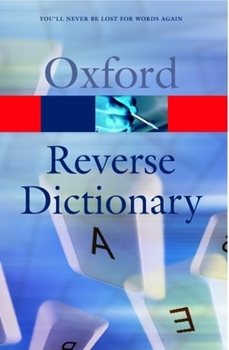The Oxford Reverse Dictionary
Select Format
Select Condition 
Book Overview
How do you find those elusive words that you just can't bring to mind but are on the tip of your tongue? Can you remember the word used to describe a fear of heights? Do you know the word for the plastic used for gramophone records? What is the word for a water slide at a swimming pool? The Oxford Reverse Dictionary will help you find words you can't remember whereas a thesaurus will find alternatives to a word that you know. Words are grouped by subject-related key words, for example lapdog, pack, retriever, and hackles can all be found under the key word dog. *Contains 31,000 entries listed under a wide range of subject areas and key words * Ideal for crossword and other word game lovers who want to find the words that they are looking for * A perfect vocabulary builder, it gives information on related adjectives, irregular plurals, and combining forms
Format:Paperback
Language:English
ISBN:0192801139
ISBN13:9780192801135
Release Date:April 2002
Publisher:Oxford University Press, USA
Length:416 Pages
Weight:0.89 lbs.
Dimensions:1.1" x 5.2" x 7.7"
Customer Reviews
3 ratings
Good on Your Reference Shelf
Published by Thriftbooks.com User , 16 years ago
If you like to search for the exactly right word, if you don't believe there's such things as synonyms, if you just love the language and enjoy browsing to learn things you don't know, then you'll enjoy this. Five stars because I'm a sucker for the sorites paradox: it doesn't top the list of must-have language references, but it's still a darn good addition to a competent reference shelf. If you're looking for a first word reference beyond a dictionary and a thesaurus, get the Random House Webster's Word Menu (Random House Newer Words Faster).
Hunting Down the Elusive Word
Published by Thriftbooks.com User , 22 years ago
The Oxford Reverse Dictionary converges on the elusive word you canft bring to mind or do not know. It letfs you take a round about route by applying a concept, or asking a question to find the word you want. For example you probably canft recall the name of Japanese acupuncture. I thought of puncturing the skin with needles, but neither puncturing nor needles got me very far but it did raise the question, what is it? A treatment, this entry led me to the keyword therapy: shiatsu. You canft do that either with dictionary or thesaurus. I wondered whether there was a word to describe the fear of number thirteen. Under the keyword fear: triskaidekaphobia.The Oxford Reverse Dictionary groups words by subject-related keywords: for example organ, advertorial, kill, D notice, silly season, chequebook journalism can all be found under the keyword: newspaper. A helpful feature is the apt and succinct and right-on-target definition that precedes every word or phrase. Taking a word out of the above list for example silly season is defined as high summer, when there is a dearth of serious news.Presented in the most ideal format yet compiled to find and learn new words. Keywords are in bold print to assist with going back and forth from text to monitor to notes so you get the information you need in the shortest and easiest fashion. The typeset, layout, choice of paper and heft of the ORD will soon make it familiar and comfortable and a word tool of choice of the student, writer, crossword buff and anyone whose business is words. - - This text refers to the Library Binding edition.
A Boon for the Writer/Poet!
Published by Thriftbooks.com User , 25 years ago
So often I'll have a word I need "on the tip of my tongue" and then it disappears. The Oxford Reverse Dictionary is a marvelous source for finding those elusive words. The other day I wanted the word for pig intestines used as food, so I looked under "pig" and there it was: "chitterlings." I find this an indispensable resource.





